The Complete Guide To Claiming Compensation For Disrupted Flights (EU Regulation 261/2004)
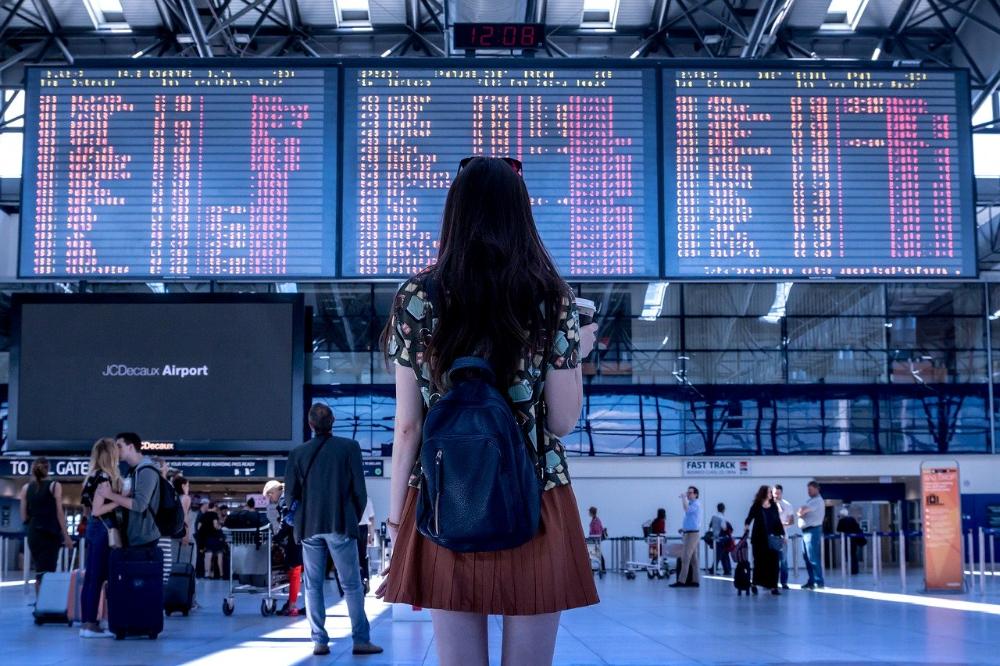
Booked a flight lately?
If you’re a regular traveller you’ve probably realized that there’s a multitude of ways in which airlines can and often do screw travellers over.
Just to state a few of the ways, they can cancel your flight at short notice, delay your departure causing you to miss connecting flights or ground transportation links, deny you boarding, downgrade you from first class to business class or from business class to economy class, and so on.
Although some of these incidents might sound rather benign, they can often leave travellers in tears, unable to return to work or needy children, stranded in foreign countries and forced to rack up ludicrous hotel bills and other unexpected expenses.
With over 9,000,000 air passengers facing flight disruptions every year, almost every traveller has suffered one of these inconveniences at one point or another. But most just accept that it happened and reluctantly (perhaps begrudgingly) move on.
But did you know that if you’ve had any delayed or cancelled flights or been denied boarding by an airline in the past few years, you could be entitled to claim compensation up to a maximum sum of €600 from the airline responsible for your pain?
If you didn't know this, you're in the majority; 60% of people aren't aware of their right to claim compensation and more than 3 billion euros (and growing) are owed to travellers every year.
Airlines rarely advertise this fact since making so many passengers aware of their rights would hurt the airline’s profits tremendously, although they are legally obliged to display a sign at their check-in counters that states:
"If you are denied boarding or if your flight is cancelled or delayed for at least two hours, ask at the check-in counter or boarding gate for the text stating your rights, particularly with regard to compensation and assistance."
Additionally, they must provide you with a clear written notice informing you of your right to compensation and how to claim it if your flight is cancelled or delayed for more than 3 hours or if you are denied boarding.
Unfortunately however, not all airlines fully comply with this obligation. Ryanair for example, has been accused of flouting these rules, burying links to customer rights at the bottom of e-mails and not mentioned anything about compensation in the e-mail itself.
But don’t worry, because you don't have to rely on the airlines to inform you about your rights.
We’ve written this article to demystify the whole subject and tell you exactly what your rights and entitlements are with respect to delays, cancellations and denied boardings, when are eligible to claim compensation for these mishaps and exactly how much you are owed.
We cover a lot of ground in this 9,500+ word in-depth guide, so let’s get started at once!
Table of contents
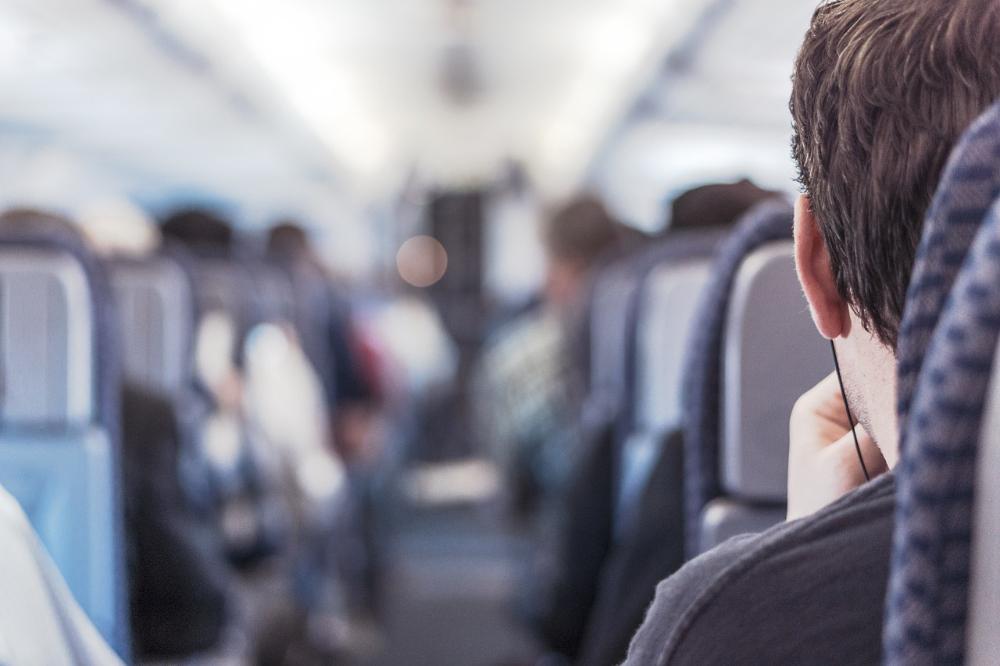
These airline passenger rights stem fromEU regulation 261/2004, also known as the flight compensation regulation, which came into force on the 17th February 2005.
Under the terms of the regulation, qualifying passengers are entitled to receive a minimum financial compensation (in cold hard cash) of €250 and a maximum of €600 for qualifying flights that were cancelled, delayed by at least 3 hours or where the passenger were denied boarding.
The regulation also lays out when passengers have the right to receive assistance from the airline, and the choices that passengers should be offered in the event that their flight is delayed, cancelled or they are denied boarding.
The regulation also states the right and compensation entitlements of passengers that were upgraded or downgraded as a result of an airline mistake or when placed onto an alternative flight after a delay, cancellation or boarding refusal.
To be eligible to receive compensation or to have entitlements in the event of a particular flight incident, you as a passenger must fulfill the following criteria:
- You must have a confirmed ticket for the flight concerned. Additionally, It must be a regular ticket available to the general public and not a heavily discounted or free ticket. Tickets issued under frequent flyer programs or other similar commercial programs do however qualify.
- You must have arrived at the airline counter in time for check-in as indicated by the air carrier, tour operator or authorized travel agent, or in the case that no check-in time was specified, at least 45 minutes prior to the scheduled departure time of the flight.
In addition to the passenger having to satisfy these conditions, the flight must also meet certain criteria as described below.
.jpg)
For you to be entitled to receive compensation or claim assistance according to the regulation, the flight that the incident relates to must also fulfill certain criteria.
The flight only qualifies if:
- It departed from any EU/EEA airport (airports in Switzerland also but Gibraltar airport does not) and was operated by any airline
- It arrived into an EU/EEA airport and was operated by an airline based in an EU/EEA member state.
- It was a motorized fixed wing aircraft. Helicopters for example, don’t fall under the regulation.
Note that any flight that does not either land into an EU/EEA airport or depart from an EU/EEA airport, does not fall under the regulation. Additionally, any flight landing into an EU airport that departed from outside the EU/EEA must be operated by an EU/EEA airline for it to be subject to the regulation.
Provided all the aforementioned conditions are satisfied, you stand a good chance of being able to claim compensation, except when the airline can reasonably claim that the delay, cancellation or denied boarding incident was no fault of their own.

One of the most common reasons that claims to compensation for delays, cancellations and denied boardings are rejected is when the airline is able to prove that they are faultless and that the event was caused by “extraordinary circumstances”.
Extraordinary circumstances, also known as “acts of God”, can include things like security threats, terrorist attacks, severe weather conditions that preclude flying, drone disruptions, lightning strikes, bird strikes (where a bird collides with the plane and damages it) air traffic control restrictions or technical faults that are a direct result of extraordinary circumstances.
Note however that ordinary technical faults that are discovered during routine maintenance cannot be used by airlines as a get-out clause to avoid paying compensation.
If an act of God was genuinely the cause of the trouble, the airline is usually not obliged to compensate passengers.
You are only due financial compensation if your seemingly unfortunate incident was not a matter of bad fortune at all, or in other words, not attributable to extraordinary circumstances.
Also, in the case of a denied boarding, airlines can only usually be held responsible when it occurred as a result of an overbooking situation; if the denial was due to inappropriate travel documents, a security or health risk or a late arrival at the departure gate, the blame is placed on the passenger and not the airline.
Now supposing the event was not caused by extraordinary circumstances and was the fault of the airline, there is yet another thing that could mess up your claim and that is if you waited too long after the event before initiating proceedings.
The flight compensation regulation is retroactive, which means that you can still claim compensation for delays, cancellations, denied boardings and other similar events that happened in the past.
But how far back claims are valid depends what country you are filing the claim in and a law known as the statute of limitations, which governs the maximum length of time after an event that legal proceedings can still be initiated.
This law normally doesn’t apply to genocide, crimes against humanity, war crimes and the like, and for other serious offences claims can often be made for events that happened decades ago, but for minor offences like airline delays and cancellations, you can usually only claim for events that occurred in the last few years.
There’s considerable variation in the time limit depending on the country concerned; in Luxembourg and Sweden you can claim for events going back ten years, while in Poland you have to claim within one year of the event.
Here are a few other European countries and their respective time limits:
1 year – Belgium
2 years – Netherlands, Switzerland (NEB complaint only, small claims procedures not possible), Slovakia, Slovenia, Malta, Italy, Iceland, Croatia, Latvia (as long as the airline is contacted within 6 months of the event)
3 years – Germany, Austria, Romania (3 years for a court claim, but only 6 months for a complaint to the NEB), Bulgaria, Czech Republic, Estonia, Lithuania, Norway, Denmark, Finland, Portugal
5 years – France, Scotland, Greece, Hungary, Spain
6 years – Ireland and United Kingdom (excluding Scotland)
10 years - Luxembourg
You may be wondering which country or countries you can file the claim in, and the answer is the European country or countries that your plane arrived or departed from.
If it was an intra-community flight, you can claim in either of the two European countries that you flew between. If your claim is old you may have no choice but to claim in the country that has the more generous time limit.
Before we get down to the nitty-gritty details of claiming compensation for delays, cancellations and denied boardings, we need to first define the three different flight types specified by the regulation that you could be claiming compensation for.
These three flight types are based on the flight distance.
It’s important that you understand the differences between these three flight types, as we will be referring to them repeatedly throughout the article.
You will also need to know your flight type when making a claim, as it’s one of the major factors that governs how much compensation you’re entitled to receive for delays, cancellations and denied boardings. It also determines how soon your right to assistance comes into effect in situations like flight delays.
We’ll call the three flight types A, B and C for convenience and they are defined as below:
Flight type A – Short-haul flights that are less than 1,500 km in distance
Flight type B - Intra-EU flights (intra-community flights) that are greater than 1,500 km or medium-haul flights that are between 1,500 km and 3,500 km and are not within the EU
Flight type C – Long-haul flights not within the EU that are greater than 3,500 km
When trying to determine your flight type, you will need to know the distance and sometimes whether it was an intra-community flight, the latter being easy to verify by checking the airports on your original ticket.
Not sure what was your flight distance? Distances are measured using the great circle route method, but you can use Webflyer’s mileage calculator to work out the distance of your flight.
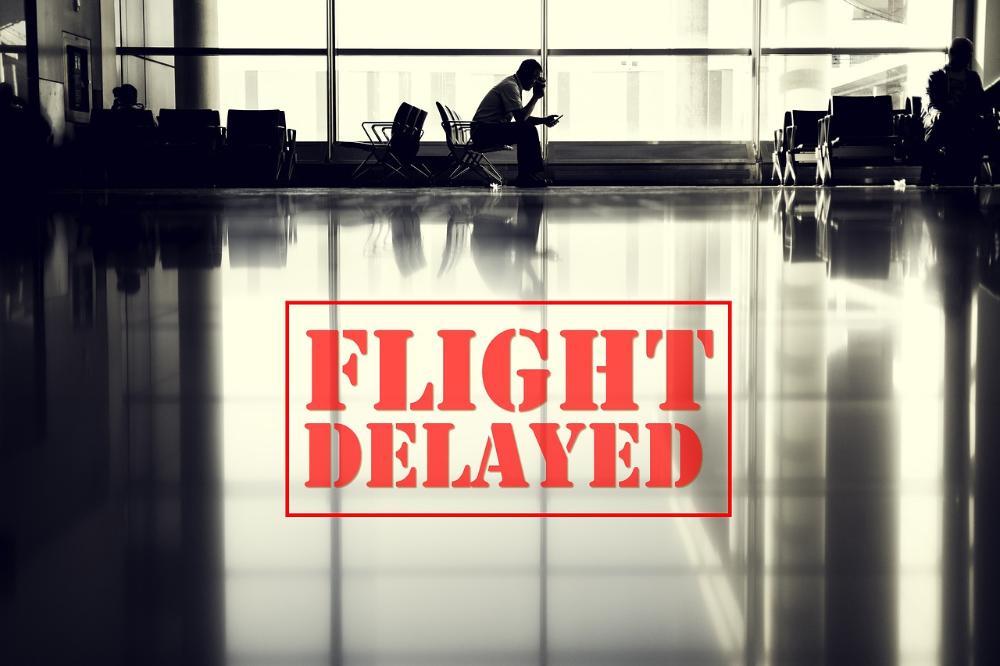
Before we delve into when you’re entitled to receive financial compensation from the airlines for delays, cancellations and denied boardings, we'll first go through the rights that EU regulation 261/2004 grants you in these situations.
Your rights for delayed flights
When your flight is delayed the airline has a duty to provide you with assistance if your flight is delayed for take-off as per the following:
2+ hours for Type A flights
3+ hours for Type B flights
4+ hours for Type C flights.
This duty of care applies regardless of whether the delay was caused by extraordinary circumstances and it means that the airline should offer the following to passengers free of charge:
- Meals and refreshments appropriate to the length of the delay, or meal vouchers
- Two phone calls, fax messages or e-mails so that you can communicate with people at your final destination and make new arrangements for onward travel and pickup.
- Suitable accommodation and transport between the airport and the hotel in the event that your flight is delayed until the following day
If take-off is delayed by 5 hours or more, you are under no obligation to take the flight and you essentially have the same rights as a passenger whose flight was cancelled (see the section directly below also).
If you should choose not to take the 5+ hour delayed flight, you are entitled to a full refund for any part of parts of your ticket already used, as well as for the part or parts not yet used (e.g. onward flights or return flights), provided that the flight no longer serves your original travel purposes.
If you are partway through your journey when you decided to cancel your 5+ hour delayed flight, in addition to the full refund you are also entitled to a free return journey back to your original point of departure.
If you decide to wait around for the 5+ hour delayed flight you could be due compensation if it causes you to arrive at your final destination at least 3 hours late and if the delay was the fault of the airline.
If your flight is delayed until the following day and you choose not to cancel, the airline has a duty put you up for the night free of charge and pay for your transport between the hotel and airport.
In reality, airlines may not always be willing to fulfill these obligations when your flight is delayed at take-off.
In that case, you’re advised to minimize your expenditure, keep the receipts and ask the airline to reimburse you for the costs incurred at a later date.
The reason you should minimize your spending is because the airline probably isn’t going to be willing to reimburse you for any purchases that could be deemed extravagant or discretionary.
In addition to your right to assistance and refund/rerouting options in the event of certain flight delays, you may also be entitled to compensation if your flight arrived at your final destination at least 3 hours late. See the section on compensation for delays below to learn more about this.
Your rights for cancelled flights
In the event of a flight cancellation where you only learned of the cancellation after reaching the airport, in addition to any compensation you may be entitled to, you also have the right to receive assistance from the airline, just like when your flight is delayed.
You are entitled to free meals and refreshments, free communication (if needs be), as well as complimentary accommodation and transport if you’ve been rebooked onto a replacement flight the following day.
In the case of any cancellation the airline is also obliged to offer you the following three options:
Rerouting to your destination at the earliest available opportunity
This is where you get put on the next available flight or even on a bus or train (with all costs covered by the airline).
Full refund for the cancelled flight
You have the right to request a full refund for the original price that the ticket was purchased at, for the part or parts of the journey that are not yet made as well as for the part or parts that have already been made, provided that the flight is no longer serving your original travel plans.
If you are already part way through a journey when the flight is cancelled you also have the right to request a return flight to the original point of departure at the earliest available opportunity, and taking this return flight does not compromise your right to claim a full refund.
Rerouting to your destination at a later date
You can also choose to be put on another flight to the same destination at a future date that’s convenient for you.
As well as your right to assistance and refund/rerouting options, you may also be entitled to claim compensation for your flight cancellation if you were not notified about the cancellation more than 14 days before your departure. See the section below on compensation for cancelled flights to see if you're eligible.
Your rights when denied boarding
Airlines often allow more seats to be booked than they have available in order to make extra money from seats left vacant because of no-shows (where a passenger with a confirmed seat never shows up for the flight) or late cancellations.
This practice of selling more tickets than available seats is not illegal. But the practice is obviously problematic and can often result in an overbooking situation since airlines can’t accurately predict the number of no-shows.
Normally the airline will attempt to remedy an overbooking situation by using rewards and incentives to coax passengers with confirmed seats to surrender their reservations.
If enough volunteers come forward you may still get a seat, but if the airline is forced to deny you boarding against your will (known as being “bumped off” your flight), you have the same right to assistance (free meals, communication, accommodation etc.), and should be offered the same refund and rerouting options as passengers whose flights are cancelled, as described above.
However, if you are denied boarding for valid reasons, such as problems with your travel documents, arrival at the gate after it closes or security/health concerns, these rights would no longer be applicable.
You can also get up to €600 in compensation if you are denied boarding against your will. But if you deny yourself boarding or in other words, you are one of the volunteers that surrenders their seat in exchange for rewards, you waive your right to receive compensation.
See the section on compensation for denied boarding below to learn how much you can claim.
Provided all the other qualifying criteria are fulfilled, you’re entitled to compensation for a delay if your actual arrival time at your destination was at least 3 hours later than the scheduled arrival time.
To be clear, the arrival time is the time when the first door of aircraft is opened to allow passengers to begin exiting the plane.
In order to be entitled to the maximum compensation amount for each flight type, your arrival at your final destination must be delayed at least 3 hours in the case of Type A and Type B flights, while for Type C flights it must be delayed by at least 4 hours.
Luckily however, for a Type C flight whose arrival is delayed by 3-4 hours you can still claim 50% of the full compensation amount.
Note also that the number of hours that your departure was delayed by is irrelevant and all that matters is whether plane was late in arriving at your final destination.
So if your plane left 2 hours later than the scheduled departure time but managed to catch up and land on time, you would be due no compensation.
For flight cancellations the situation is a little more complicated to work out the compensation than for delays, but we’ll slowly work through it.
The first thing to know is that if you were notified about the cancellation 14 days or more before the scheduled departure time, you are not entitled to receive any compensation, even if no substitute flight was provided for you.
If you were notified between 7 and 14 days and an alternative flight was arranged for you, the amount of compensation you’re entitled to depends on how early your plane departed and how late it arrived, with respect to the originally scheduled departure and arrival times of the cancelled flight.
If you were notified within 7 days of the scheduled departure time and an alternative flight was arranged for you, the amount of compensation you’re entitled to depends on how early your plane departed and how late it arrived, with respect to the originally scheduled departure and arrival times of the cancelled flight. In this case the airline has less leeway than in the previous case.
We cover the exact rules and compensation amounts for these two situations the next section below.
If you were notified within 14 days or within 7 days and no alternate flight was provided for you, you are entitled to compensation.
If you weren’t notified at all and only discovered that your flight was cancelled after you reached the airport, the same rules apply as for when you are notified of the cancellation within 7 days.
A note on compensation for re-scheduled flights
Re-scheduled flights are treated in the same way as cancelled flights, where the newly scheduled flight is considered in the same way as the alternate flight that is provided in the event of a normal cancellation.
You are entitled to claim compensation for denied boarding if it was because of an overbooking or mistake on the part of the airline and not for any of a number of reasons that would shift the blame onto you instead of onto the airline.
If you are entitled to compensation for a denied boarding, you can claim the full amounts according to the section below if you chose not to be put onto an alternative flight by the airline and chose the refund or refund plus return flight option instead.
If you chose to be placed on an alternative flight in the event of a denied boarding, you are only entitled to compensation if your arrival at your final destination was delayed with respect to the scheduled arrival time of the flight you were not allowed to board.
See the section below to learn exactly how much you claim for denied boarding depending on the length of the delay at your final destination and your flight type.

This is the part of the article where you'll really begin to see how the devil is in the details.
Deciding how much compensation you're due can be a tricky task and is one of the reasons that so many third parties have gotten involved in helping travellers to claim their dues from the airlines. More on that later though.
EU regulation 261 specifies three standard compensation amounts, namely €250, €400 or €600.
The amount that you are entitled to is primarily determined by your flight type, which we covered near the beginning of the article.
Just as a quick reminder:
Flight Type A – Short-haul flights that are less than 1,500 km in distance
Flight Type B - Intra-EU flights (intra-community flights) that are greater than 1,500 km or medium-haul flights that are between 1,500 km and 3,500 km and are not within the EU
Flight Type C – Long-haul flights not within the EU that are greater than 3,500 km
Here are the standard payouts for the different flight types:
Flight Type A - €250
Flight Type B - €400
Flight Type C - €600
To be clear here, a 3+ hour delayed flight within the EU that was greater than 3,500 km would only qualify for €400 in compensation because the €600 is only awarded for flights not within the EU that are greater than 3,500 km.
Note however, that there is one clause in the regulation stating that in the case of a passenger arriving on a rerouted flight in the event of a disruption, airlines are permitted to halve the standard compensation amounts if the delay is less than 2/3/4 hours for flight types A/B/C respectively.
In the case of delays
In the case of flights that are delayed, the standard compensation amounts of €250, €400 and €600 are only paid out when the following are satisfied:
- For Type A and Type B flights, the delay in arriving at your destination needs to be at least 3 hours for the standard payout. A sub 3-hour delay results in no payout at all both these two flight types.
- For Type C flights the delay in arriving at your destination needs to be at least 4 hours to receive the standard compensation amount of €600. In the event of the delay being only 3-4 hours, the airline has the right to only pay out €300 (50% of the full amount), but often they will still pay out the full €600. A sub 3-hour delay results in no payout here as well.
In the case of cancellations
If your flight was cancelled within 14 days of the departure and you were not offered rerouting, you are entitled to receive the full compensation amount of €250/€400/€600 for flight types A/B/C respectively.
In the case ofbeing rerouted on an alternative flight due to a cancellation or denied boarding, the payout is decided by the flight type, length of the delay and when you were notified about the cancellation.
The air carrier has the right to halve (reduce by 50%) the compensation amounts if the passenger’s arrival at their final destination is delayed by less than a certain number of hours, depending on the flight category and time of notification.
When you were notified of the cancellation 14 days or more before the departure:
You are not entitled to receive any compensation.
When you were notified of the cancellation 7-14 days before the departure:
For Type A flights, the full payout of €250 is only awarded when your arrival is delayed by 4+ hours
or
when your replacement flight departs 2+ hours early and arrives 2+ hours late.
When your replacement flight departs 2+ hours early and arrives less than 2 hours late, the payout is halved to €125.
For Type B flights, the full payout of €400 is only awarded when your arrival is delayed by 4+ hours
or
when your replacement flight departs 2+ hours early and arrives 3-4 hours late
When your replacement flight departs 2+ hours early and arrives less than 3 hours late, the payout is halved to €200.
For Type C flights, the full payout of €600 is only awarded when your arrival is delayed by 4+ hours.
When your replacement flights departs 2+ hours early and arrives up to 4 hours late, the payout is halved to €300.
When you were notified of the cancellation within 7 days of the departure or were not notified at all:
For Type A flights, the full payout of €250 is only awarded when your arrival is delayed by 2+ hours
When your replacement flight departs 1+ hour early and arrives less than 2 hours late, the payout is halved to €125.
For Type B flights, the full payout of €400 is only awarded when your arrival is delayed by 3+ hours
When your replacement flight departs 1+ hour early and arrives up to 3 hours late, the payout is halved to €200.
For Type C flights, the full payout of €600 is only awarded when your arrival is delayed by 4+ hours.
When your replacement flight departs 1+ hour early and arrives up to 4 hours late, the payout is halved to €300.
In the case of denied boarding
In the case of a denied boarding against your will (involuntary denied boarding) where the airline was responsible and you were not offered rerouting you are entitled to the full compensation amounts of €250/€400/€600 for flight types A/B/C respectively.
In the case of denied boarding where you were rerouted to your destination, the payout depends on the flight type and how late you arrive at your final destination.
For type A flights, the compensation due is €250 if the replacement flight arrives 2+ hours late and €125 if it arrives less than 2 hours late.
For type B flights, the compensation due is €400 if the replacement flight arrives 3+ hours late and €200 if it arrives less than 3 hours late.
For type C flights, the compensation due is €600 if the replacement flight arrives 4+ hours late and €300 if it arrives less than 4 hours late.
If you are denied boarding and no replacement flight is provided the airline is actually supposed to pay you the compensation immediately at the airport, but if they refuse to do so you can always claim it later.
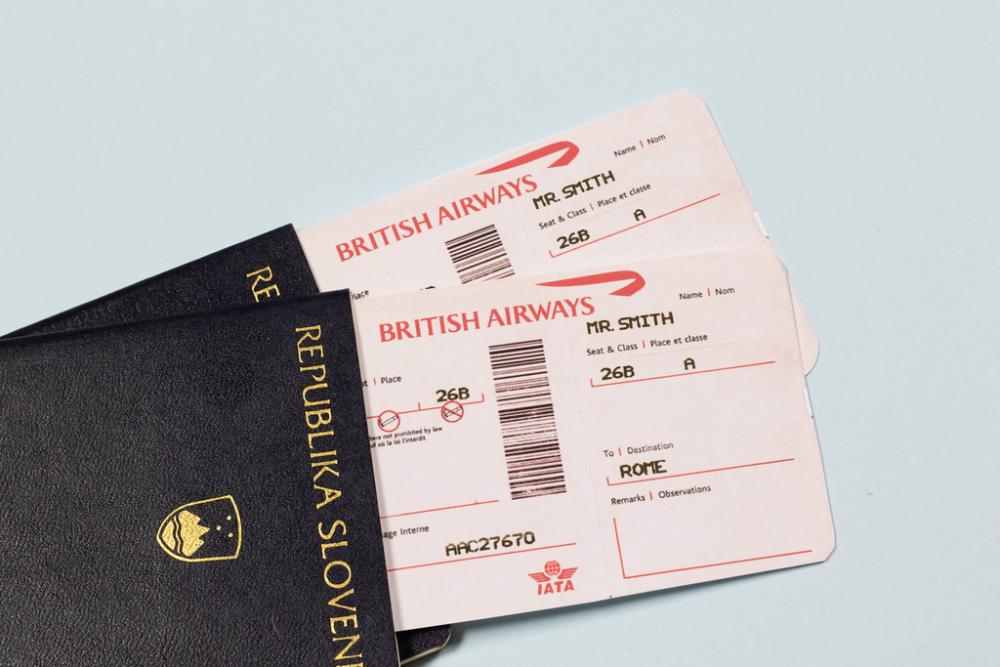
It’s one thing to determine if you’re due compensation if you took a one-way flight that departed from an EU/EEA airport or if you took a one-way flight that arrived into an EU/EEA airport with a European carrier.
But what about the more complicated journeys that often occur in the real world - journeys that are comprised of two, three, four or more individual legs?
According to a recent ruling by the European Court of Justice (ECJ), EU carriers selling multi-leg tickets for journeys extending beyond the EU have to pay compensation to their passengers for any disruptions (delay, cancellation, denied boarding etc.) that affect not only the first leg departing from the EU, but also all the subsequent legs of that same journey.
This ruling still holds water if none of those subsequent legs of the journey are in the EU or if they are operated by a non-EU carrier.
So supposing Czech Airlines sold you a through ticket from Prague to Bangkok with a stopover in Abu Dhabi, where the first leg was operated by Czech airlines and the second leg was operated by Etihad airways, a non-EU airline.
If your second flight from Abu Dhabi to Bangkok with Etihad Airways was delayed by non-extraordinary circumstances and this caused you to reach Bangkok 4 hours late, would you be due compensation? According to the ruling, yes you would, and Czech airlines would have to fork out for the mistake of Etihad Airways.
Do note however, that the ruling only applies if you’ve booked all of the flights together on a single through ticket sold by the EU carrier operating the first leg of the journey.
If you booked the flights individually with the different airlines, you wouldn’t be due any compensation for a disrupted flight departing from an airport outside the EU.
So that’s how it works for multi-leg journeys that originate in the EU, but what about a multi-leg flight originating outside the EU?
Let’s say you booked a flight from San Francisco (SFO) to Paris (CDG) with a stopover in LA (LAX), where the first leg was operated by Alaska Airlines and the second leg was operated by Norwegian.
If the first leg of your journey between SFO and LAX was disrupted would you possibly be due compensation? No, there is no possibility of compensation because that first flight was not destined for an EU airport and even if it had been, it was not operated by an EU carrier.
What if the second leg (from LA to Paris) with Norwegian was disrupted? In that case you might be due compensation if all the other necessary conditions were satisfied, since this flight arrives into an EU airport and is operated by an EU carrier (Norwegian).
But when determining the compensation amount due, how do you determine the flight distance when you’re dealing with multi-leg journeys?
If the first leg of your journey was disrupted, do you use the distance from the point of departure to the first stopover airport or do you use the distance from the point of departure to the final destination?
The correct answer is the latter.
Here is the general rule:
You look at the immediate (direct) distance between the point of departure of the flight that caused the disruption and the final destination of the journey.
So for example, if you arrived late at your second stopover during a multi-leg journey, you would use the direct distance between the first stopover (the point of departure of the flight that caused you to arrive late) and your final destination.
Compensation can be paid to passengers either by cash, electronic bank transfer, cheque or bank order by airline and should be credited within 7 working days.
With the signed agreement of the passenger, it can also be paid in kind via travel vouchers or other services, but you are under no obligation to accept this type of payment and in fact, many airlines do try to fob off passengers’ compensation claims by offering such vouchers.
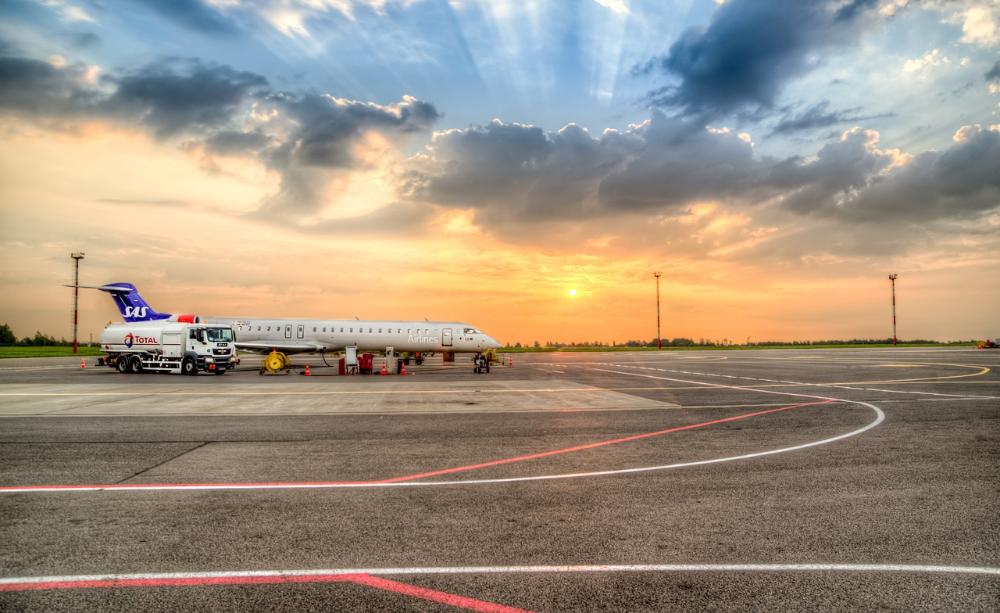
Disruptions in the case of multi-leg journeys can give often give rise to the scenario of missing a connecting flight, where you could also be due compensation.
There are other situations where you can often claim too, such as when you're downgraded to a lower class or when your flight is diverted to the wrong airport, causing you to arrive late at your final destination.
Missed connecting flight
If you were travelling on a multi-leg ticket, you might be entitled to receive missed flight compensation from the airline if a disruption affecting one of the flights in your itinerary caused you to miss your connecting flight.
There are three important conditions that have to be satisfied for you to be able to claim compensation for a missed connecting flight:
You must have been travelling on a through ticket
The disrupting flight and the connecting flight must both be part of the same ticket or under the same booking, which is known as a through ticket.
This is because when the flights are booked as a single ticket it is the airline’s responsibility to ensure that you have enough time to make your connecting flight, whereas if you book the flights separately, it is then deemed to be your responsibility that you’ve left enough time to make the connecting flight.
The airline is to blame for you missing your connection
In order to be able to claim compensation, the airline obviously has to be at fault for you missing your connecting flight.
If the delay or cancellation that caused you to miss your connection was caused by extraordinary circumstances, you wouldn’t be entitled to claim compensation.
Likewise, if you had sufficient time to make your connecting flight and you still missed your flight because of your own negligence or a personal issue, then you would not be eligible to claim compensation.
Note: “sufficient” here means that you had no less than the minimum connecting time, which is the minimum amount of time deemed necessary for you to catch your connecting flight, as specified by the airport you arrived at.)
The flight that caused the disruption must qualify under EU regulation 261/2004
The flight that caused you to miss your connecting flight has to satisfy the usual condition of having departed from an EU/EEA airport with any airline or arrived into an EU/EEA airport with a European airline.
The flight that caused you to miss your connecting flight has to satisfy the usual condition of having departed from an EU/EEA airport with any airline or arrived into an EU/EEA airport with a European airline.
How much compensation you’re entitled to for a missed connection depends on how late you arrive at your final destination or whether you even arrive at all.
If the airline does not assist in providing you a replacement flight you would be entitled to the full compensation amounts of €250/€400/€600 for flight types A/B/C respectively.
If the airline does provide a replacement flight and you reach your destination at least 2/3/4 hours late for flight types A/B/C respectively, you would also be entitled to the full compensation amounts of €250/€400/€600.
Flight Diversions
You manage to board your flight without any hiccups – no delays, no cancellations and you reached the gate in time.
The plane takes off without a hitch and it seems like nothing can go wrong now, but then while you’re in mid-air at cruising altitude, everything suddenly goes pear-shaped. The pilot announces that your flight has to be diverted to another airport where it’s convenient for him to land.
Unfortunately, flights do occasionally get diverted and are forced to land at destinations other than the ones they were originally bound for.
This can happen for a variety of reasons including adverse weather conditions, security threats, on-board medical emergencies, obstreperous or drunken passengers, mechanical failure, fugitives on board the plane and so on.
In some cases it’s not the pilot that makes the decision but one of the air traffic controllers (ATC), who asks the pilot to deviate from the normal course because of an incident that might affect the plane.
A flight diversion is treated like other delayed arrival scenarios, where you are usually entitled to compensation if you ultimately reach your original destination at least 3 hours later than you were supposed to.
Remember that a delay of 3 hours or more entitles you to the full compensation of €250 and €400 for flight types A and B respectively, while for flight type C your arrival needs to have been delayed by at least 4 hours to receive €600 and 3-4 hours to receive €300 (50% payout).
Again, the usual caveats apply, that the airline must be the one to blame for the diversion and the flight must have departed from an EU airport or was supposed to land in one with a European carrier.
If the diversion was due to a common mechanical problem you should be able to claim, since these are not considered to be extraordinary circumstances by most ruling authorities.
Upgrades & Downgrades
You are also eligible for compensation if you were downgraded from first class to business class, or from business class to economy class. This often happens in the event of a cancellation when you choose to be rerouted to an alternate flight.
In this case the applicable compensation amount is as follows:
30% of the original ticket price for type A flights
50% of the original ticket price for type B flights
75% of the original ticket price for type C flights
If you were by chance upgraded to a higher class by the airline because no other seats were available in the alternative flight, they do not have the right to ask you to pay anything extra. If they did, then you’re due a refund.
EU regulation 261 makes it very clear that it is only ever the passenger who can file a claim and who is entitled to receive the compensation for any flight disruption, and never the person who paid for the ticket.
If you’re a business traveller and the flight was paid for by your company, it is still only you the passenger who can file a claim and who is entitled to receive the monetary compensation from the airline.
However, if an employee had signed a contract with the company where he had agreed to a clause stating that he was compelled to hand over to his employer any money claimed as compensation under EU regulation 261/2004, in that case he would have to part with the funds.
Refunds are another matter, and if any refunds are due from the airline for flights that the passenger opted not to take when he had the right to decline them, then the person or company who paid for the flight is fully entitled to receive the refunded money.

If you were flying as part of a group, every individual member of the group is entitled to claim the relevant compensation amount they’re due. The compensation amount of say €600 is never divided up between the members of the group.
So let’s imagine for example you were flying as part of a group of six people and your 3,500+ km flight departing from the EU was delayed on arrival by more than 4 hours.
In this case the group could claim a total of €3,600 (€600 per passenger) from the airline provided the delay was not caused by factors outside of the airline’s control.
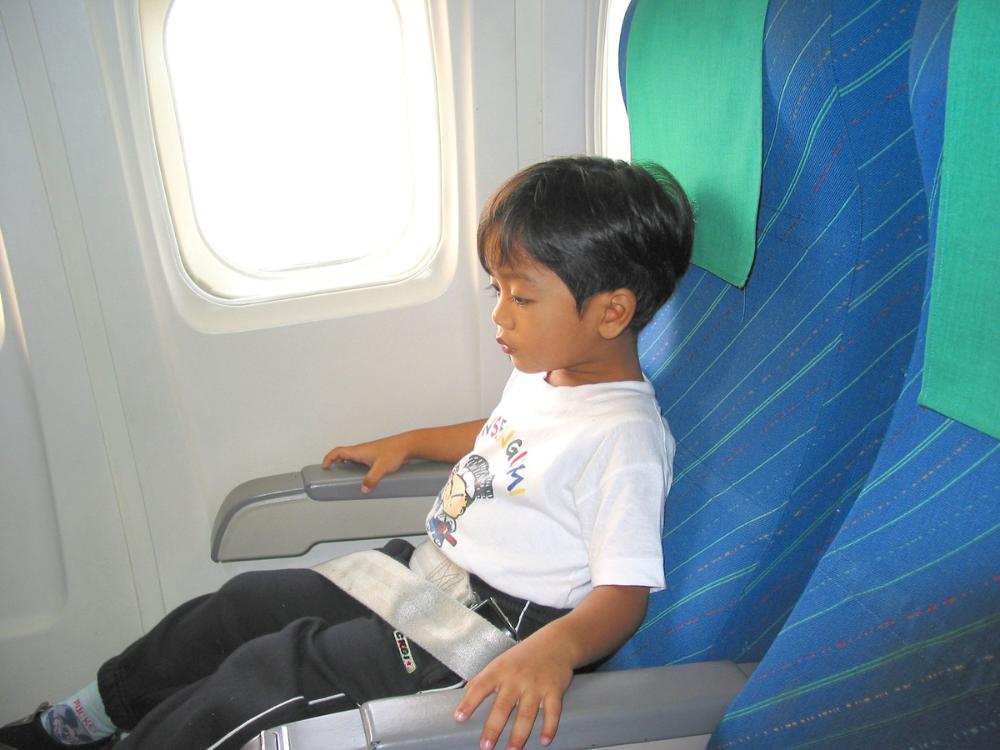
Many airlines allow babies or infants to travel in the laps or arms of their parents on board the flight, without the child having an assigned seat of their own.
So can you claim compensation for your infant in this situation too?
The answer is no, not usually.
The general rule is that only passengers for whom a seat was booked can claim compensation; the passenger has to have paid a proper airfare, whether it was a full adult fare or a reduce child fare.
Some airlines will charge some kind of an administration fee to bring along a baby or an infant on your lap, but this fee is not normally deemed to be the same thing as an airfare by the courts, and the infant is considered to have travelled for free.
In most cases, you won’t have much of a hope in claiming compensation unless your child has their own seat and is at least 2 years of age.
Once a child is at least 2 years old, most airlines will require them to have their own seat, which will normally be substantially cheaper than an adult seat.
Despite a child’s seat being much cheaper than an adult seat, it still counts as a real airfare, so you can certainly claim the same amount of compensation for a child in this case as you can claim for an adult.
Unfortunately, if the airline that owes you compensation for your disrupted flight goes bankrupt, you probably won’t receive the money and there’s not much you can do to make them pay up either.
A bankrupt airline is one that’s heavily in debt and that owes a lot of money to a lot of different companies and organizations.
You as a passenger are also one of their creditors but you are way down at the bottom of their priority list and they probably aren’t going to have the means to pay you.
However, if you paid for your flight with a credit card and it got cancelled with no refund because of a bankrupt airline, your credit card company might at least be able to refund you the money you paid for the flight.
For this, you need to file a chargeback dispute and it should be placed within a the usual timeframe of 60 or 120 days after the purchase was made. If the claim is not placed within the timeframe it is often still possible but will be much more difficult to file a successful claim.
Recently, two college students who were returning home after a summer vacation were supposed to fly from Paris to the US with Primera Air, but the airline cancelled their flight, forcing the two girls to book a costly $1,103 (per person) flight to get home.
A few months later the airline announced bankruptcy and in the meantime one of the girls had been unable to get any reimbursement for the alternate flight or even for the original airfare, despite repeated attempts to initiate a chargeback dispute with her bank (Bank of America)
After a lot of back and forth with the bank a third party also getting involved to assist the girl with her dispute, there was ultimately a positive result in the end, where the girl’s bank were able to refund her the amount of the original airfare.
The lesson learned? Don’t delay too long when you need to file a chargeback dispute (and don’t place too much faith in obscure low-budget airlines.)
If your flight didn’t leave from an EU airport or arrive into one, you might still be able to claim compensation under the 1999 Montreal Convention.
This is an agreement that applies to international flights and that has been signed by around 120 countries.
But do note that you have only have two years to claim with this and it only compensates you if the flight delay actually resulted in damages (i.e .financial loss), whereas the EU regulation compensates you for delays regardless of whether or not you incurred financial loss as a result.
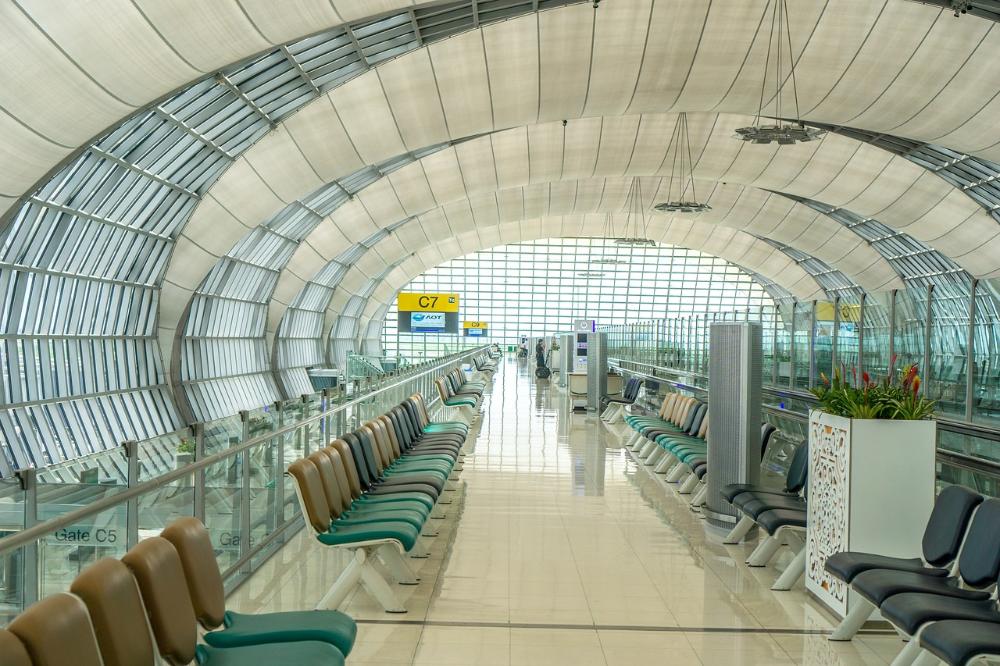
For you as a passenger, there is nothing to lose in trying to claim compensation except for your time (and possibly money if you go down the route of hiring a lawyer) spent in trying to enforce the claim.
If you go through an online intermediary (see the next section below) however, you have virtually nothing to lose and only something to gain.
Airlines have stated that these compensation claims will force them to increase their airfares and some already have done just that. Ryanair for example have been levying a surcharge of €2.50 per passenger per flight for years now to cover their expenses relating to compensation claims.
If this is the surcharge required just to offset losses, then it means that these compensation claims are costing Ryanair about €250 million euro a year, which is around 20% of their net income.
But right now only a fraction of eligible passengers are attempting to claim, so the airlines are still not experiencing the full potential impact of the regulation.
Which? ran a survey on 7,000 of its members asking them about their experience flying from a UK airport, and only 38% of the people surveyed said they had claimed following a flight delays.
The main reason for this seems to be that people just don’t know about the regulation and aren’t aware of their rights. Another factor is undoubtedly the complicated rules that make it daunting for people to file a claim.
As things currently stand, it would seem that a few more passengers knowing their rights and claiming compensation are not going to do any substantial damage to the aviation industry.
Maybe don’t tell too many people about it and just keep this a secret if you don’t want to see airfares rise in the future.
So this all sounds fantastic in theory, but in practice, how easy is it to actually wring the money you’re owed out of the airlines?
According to many claims management companies, only 2% of all travellers eligible for compensation actually end up receiving it.
Now of course one of the reasons the success rate is so low is because less than half of people who are entitled to claim compensation actually file a claim. But another major reason is that airlines have become exceptionally skilled at finding ways to avoid paying up.
The fact of the matter is that the vast majority of people who try to file a claim on their own against an airline will come up against a brick wall, even if their claim is completely valid.
Indeed, airlines, like insurance companies, will go to almost any lengths and will use every trick in the book to avoid paying their dues to passengers.
They hire experts to find loopholes in the regulation and these people know the ins and outs of it, and will find a way to deny your claim if it’s anything except rock solid. One tiny hole in your submission and they will tear it apart.
Some airlines even go as far as lying to passengers about their rights or about the circumstances that caused the flight disruption that the passenger is claiming compensation for.
But you can’t really blame the airlines, since they are only doing what’s necessary to survive in the industry and to hold onto their hard-earned profits.
If they were to instantly approve all valid claims without protest, they would quickly find their annual expenditure skyrocketing by millions of euros and we would probably witness a lot more airlines being bankrupted and others with substantially reduced net incomes.

Some people will attempt to claim the compensation directly from the airlines by sending them an e-mail or letter describing the incident and the compensation amount they are due, along with relevant supporting documentation such as boarding passes, flight number, flight itinerary and the cause of the disruption.
If your flight was a long time ago and you don’t have all the necessary documentation or you’ve forgotten the details of the disruption, you might be able to retrieve some of the information from a flight database.
But in any case, claims made by passengers normally fall on deaf ears or are denied, at least initially.
If you are unsuccessful at first, the next step is to escalate the claim to a legal body such as an NEB (national enforcement body) or an ADR (alternative resolution dispute) scheme in the appropriate country. To figure out which is the relevant NEB or ADR scheme to direct your claim to, you’ll have to do some research.
If these two options fail, the last resort is usually to escalate the matter to the small claims court, which will entail getting a lawyer involved. But this option has serious drawbacks, since lawyers will typically take an upfront fee, which you lose whether you win the case or not.
Additionally, your lawyer might not be specialized in the field of air passenger rights, and it will be time-consuming to deal with one, as you’ll have to have to do a lot of back and forth communication with the lawyer, as well as submit a lot of paperwork.
By now you're probably starting to see how much hassle this could be to handle all on your own.
Wouldn’t it save a lot of time and headache if there was some professional service that files and pursues the claim on your behalf to get you the money you’re owed and that works on a “no win, no fee” contingency basis, where you only have to pay a fee to the company if your case wins, and nothing when it loses?
Well luckily, there does exist such a service.
In fact, myriad such services exist and they are known as claims management companies or CMCs.
CMCs have teams of lawyers, aviation experts, former national enforcement body executives, customer service teams, AI engineers and many other employees that make them a formidable force against airline resistance.
The way these companies work is that you first submit an application (it normally takes just a couple of minutes) on their website and they will then have their team of lawyers assess your legal position.
If everything looks good, the company will then put all your documents and the supporting arguments for the claim together and submit the claim to the airline. If the CMC decides at this stage that the claim is not worth pursuing, they will usually notify you within a few business days.
Once your claim has been submitted the CMC will then handle all further communication with the airline after this point, turning all of the airline’s objections with compelling arguments stating the passenger’s legal position and entitlements.
The company will endeavour to keep you abreast of how your case is progressing, notifying you about any important developments, such as the initiation of court proceedings.
If the airline is not willing to listen, the CMC may then launch legal proceedings on your behalf.
They do this by subcontracting legal firms or lawyers but you don’t have to cover any of the legal costs involved, although some CMCs may increase their success fee in the event that the claim is taken to court.
Most of the companies we recommend below however charge a fixed success fee, regardless of whether your case goes to court or not.
If your claim is successful, the CMC will send you the money awarded minus their cut, which varies from company to company. But most of the reasonable ones take a 25% cut, which is often called the “success fee”.
If your claim is rejected there’s no harm done, because these companies operate on a no-win no-fee basis.
By handling the case for you, a CMC saves you the time you’d waste arguing with the airline and takes on the financial risk of enforcing your claim in court. Once you’ve submitted your application you can just get on with your life and let them pursue your claim to its conclusion.
But do these companies really provide such a necessary service, and most importantly, is the service they provide worth the 25% (or more for some companies) cut that they take out of your compensation?
Well, you can take a look at one interesting case involving a woman whose flight from Milan to New York with American Airlines was delayed on arrival by 3 hours and 25 minutes.
When she claimed from the airline they actually offered her the correct amount of compensation (€300), but she mistakenly thought she was entitled to €600, which they kept refusing to pay her after a lot of back and forth.
She then enlisted the help of Airhelp, a large claims management company, and Airhelp actually managed to claim €600 from the airline on her behalf. The woman then received €450 in her bank account after Airhelp had taken their cut.
So even though the woman received more money than she was actually due, in this case it certainly paid off to go through a claims management company.
The truth is that you are dealing with a very slippery foe indeed that is an expert at reflecting the bullets that are fired at it.
If you know the rules of EU regulation 261/2004 inside out and you think you can beat the airlines at a game they have become experts in, then by all means you might be better off filing your claim on your own without the assistance of a CMC.
But many people won’t have a strong enough grasp of the terms of the regulation to be able to crush the airline’s strong defenses.
To help make your decision easier, we've listed the relative pros and cons of making a claim by yourself versus enlisting the services of a claims management company.
Claiming on your own
Advantages
- Pay no commission and keep the full compensation amount
Disadvantages
- Low chance of success if you lack expertise in the aviation industry or have no legal background
- Airlines will usually offer you vouchers or much less money than you’re entitled to in order to fob you off
- A lot of your time is wasted on the back and forth dialogue with the airline (and time is money in today's world)
- You have to bear all the court and lawyer fees yourself if the claim has to be escalated and there’s a risk of losing the case and incurring financial loss
- You may not even be able to afford the legal fees involved in taking the airline to court
Claiming through a CMC
Advantages
- Streamlines the whole application process (online form takes just 2 minutes to fill out).
- No time wasted on back and forth correspondence with the airline.
- The company covers all the legal fees and bears the risk.
- The company has access to databases and legal evidence that you don't.
- If you've already unsuccessfully tried claiming on your own or your claim seems overly complicated for a mere mortal to handle, you've nothing to lose by going through a CMC.
Disadvantages
- You have to surrender a decent chunk of your compensation if your claim is successful.
- You don’t know how hard the company is going to fight your case for you (they might only be interested in taking the low-hanging fruit or the claims that are likely to be most profitable for them).
If by this point you've decided that your claim would be best handled by a professional and you don’t want to deal with any upfront costs, you’ll want to submit your application to a CMC via their online application process.
But as we mentioned previously, there are gazillions of these companies all vying for your custom, so how do you decide which ones to place your trust in?
You have to be careful, because these companies are receiving your compensation money from the airline on your behalf, and there are several scam companies out there that will just keep your money after they've been paid by the airline.
Well luckily for you, we’ve done the research and come up with a list of the 4 top-rated and most trustworthy CMC companies for you to file your claim with, along with a brief description of each company.
Compensair
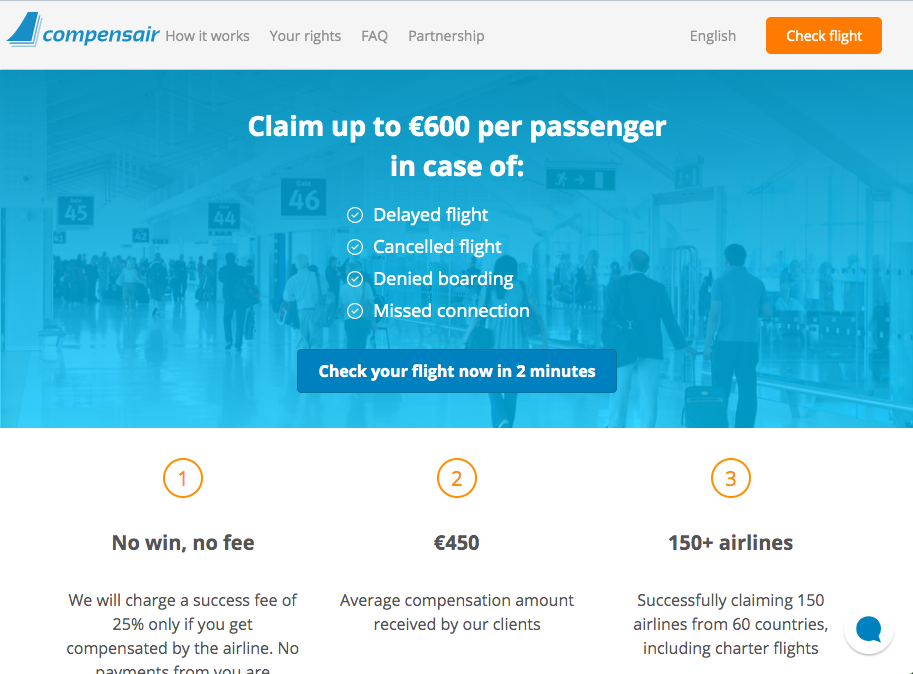
Compensair is a Singapore-based claims management company that takes a 25% cut of your compensation amount if they win the case.
On their home page they state that the average compensation amount received by their applicants is €400 and that they claim from 150 airlines in 60 countries, including charter flights.
Their high average star rating of 4.6/5 on Trustpilot with 87% of all reviews being “excellent” speaks for their legitimacy as a company who can really help you to get the money you deserve from the offending airline.
AirHelp
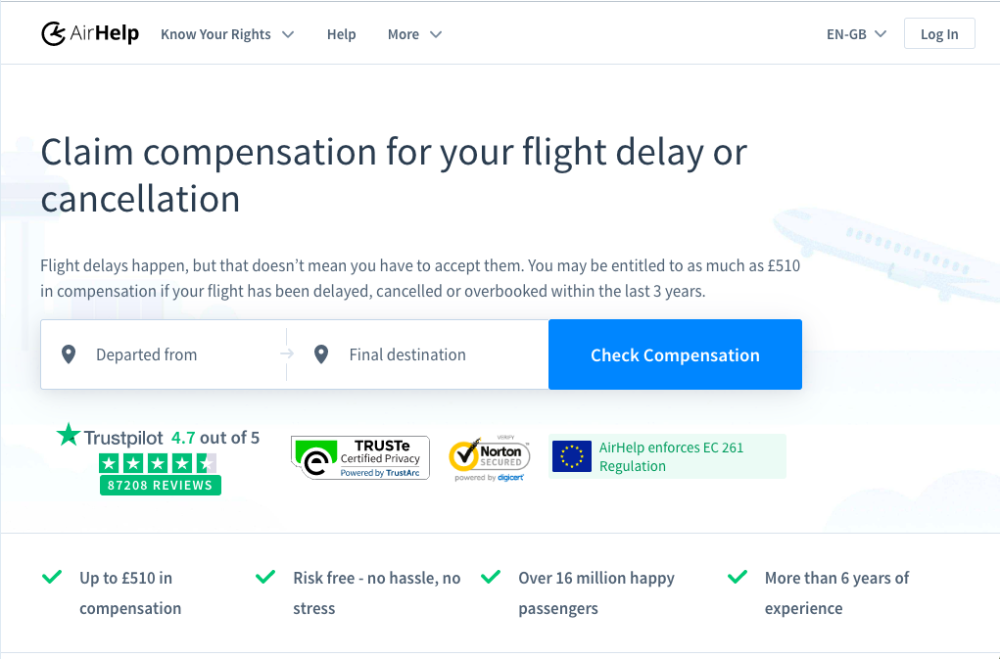
AirHelpis the biggest CMC company out there, employing about 750 people.
It was founded in a startup in 2013 and since then has helped over 16 million travellers to claim compensation from airlines for disrupted flights. The company now calls itself the "world’s largest air passenger rights advocate".
The only major caveat with AirHelp is that they take a 15% extra fee (50% in total) for cases that go to court. If they are able to resolve your case with the airline however, you’ll just pay a 35% success fee, which is a little higher than the fee taken by some of the other companies we’ve listed here.
It would seem that because AirHelp has become so popular and well-trusted, they are able to charge a bit more than the smaller companies who are probably fighting just to attract new customers.
Even with almost 90,000 reviews on Trustpilot, AirHelp has maintained a high average star rating of 4.7/5 with 83% of all reviews being “excellent”.
ClaimCompass
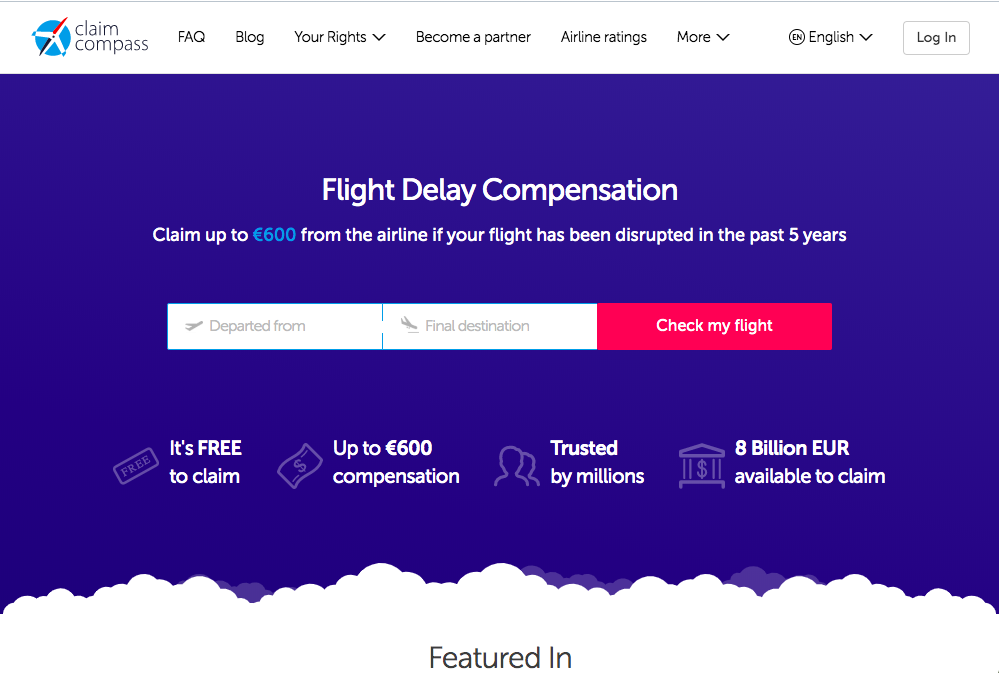
ClaimCompass is headquartered in Sofia, Bulgaria but also has offices in Mountain View, California. It's a smaller company than Airhelp but bigger than Compensair.
The company has written a number of very helpful, in-depth articles to better educate passengers on their rights and entitlements to compensation in a wide variety of scenarios.
There is no fee to submit a claim through their website and they only take a 25% success fee including VAT if they secure the compensation amount on your behalf, and the success fee remains the same (25%) even if your case goes to court.
The service has a high average star rating of 4.6/5 on Trustpilot, with 83% of all the 700+ reviews being “excellent”.
Skycop

Skycopis a medium-sized CMC based in Vilnius, Lithuania.
The company has a high 4.6/5 average star rating on Trustpilot, with 86% of all the 800+ reviews being “excellent”.
Skycop takes a 25% (excluding VAT) fee when a claim is successful and charges no upfront fees to submit an application.
Major disruptions to your air travel itinerary will always be a nightmare, but whenever the airlines are to blame, your rights to fair treatment and compensation are now at least protected under EU regulation 261/2004.
Unfortunately however, the regulation is complicated and the confusing terms often make it difficult for air passengers to know where exactly they stand in relation to their rights and entitlements to compensation.
A number of claims management companies have cropped up in the last few years to address this issue and to fight for passengers’ rights when they would otherwise be taken advantage of by the airlines, who are better informed and have a better grasp of the nuances of the regulation.
Thanks to the services of such companies, every traveller now has a much higher chance of successfully enforcing their claims and getting the reimbursement they’re due.
If you enjoyed this article or found it useful, please share it with other travellers. Have you ever claimed compensation for a disrupted flight? How was your experience? We'd love you to leave us a comment below telling us your story.
Your content goes here...
JOIN OUR LIST
SUPPORT US
FOLLOW US
ABOUT US
Our names are Eoghan and Jili and we hail from Ireland and India respectively.
We are two ardent shoestring budget adventure travellers and have been travelling throughout Asia continuously for the past few years.
Having accrued such a wealth of stories and knowledge from our extraordinary and transformative journey, our mission is now to share everything we've experienced and all of the lessons we've learned with our readers.
Do make sure to subscribe above in order to receive our free e-mail updates and exclusive travel tips & hints. If you would like to learn more about our story, philosophy and mission, please visit our about page.
Never stop travelling!
FOLLOW US ON FACEBOOK
FOLLOW US ON PINTEREST
-lw-scaled.png.png)


